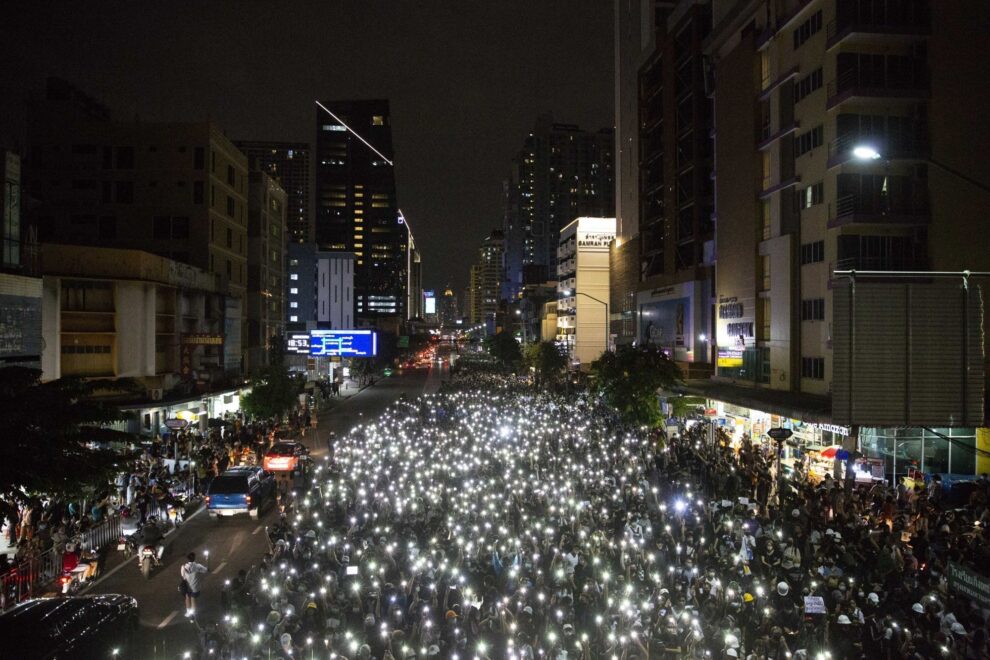
(Bloomberg) — Thai protesters gave Prime Minister Prayuth Chan-Ocha three days to resign and meet other key demands that include reforming the monarchy, appearing to reject an olive branch he offered in a televised address.
Thousands of demonstrators on Wednesday night broke through police barricades and barbed wire to march toward Prayuth’s official office. They gathered near the building, known as Government House, shortly after the prime minister said his government is prepared to withdraw emergency rules banning large gatherings in the capital if the protest remain peaceful.
“We submitted the letter for Prayuth to resign, which is one of our three demands,” Free Youth, one of the main protest organizations, said in a Facebook post on Wednesday night. “If the government doesn’t give an answer within three days, the people will return with higher demands than before.”
Prayuth has struggled to stem the mounting street demonstrations, which have used Hong Kong-style pop-up rallies to avoid police and defy an emergency decree issued last week. The government has shown no signs of meeting the protester’s demands, which would upend the royalist elite that has maintained power throughout much of Thailand’s history, but it has also sought to avoid bloodshed that could further roil the economy.
“I will make the first move to de-escalate this situation,” Prayuth said in an address to the nation on Wednesday. “I am currently preparing to lift the state of severe emergency in Bangkok and will do so promptly if there are no violent incidents.”
The protests are underpinned by years of sluggish growth now exacerbated by the coronavirus pandemic, which has put the Thai economy on course for its worst performance ever by derailing the two main drivers: tourism and trade. The benchmark SET Index of stocks has lost 23% this year.
Thailand’s financial markets will take a wait-and-see approach to the protests and the government’s response, said Tim Leelahaphan, an economist at Standard Chartered Bank Pcl in Bangkok.
“It remains to be seen if the emergency would hurt the government’s plan to gradually reopen tourism to foreign visitors from this month,” Leelahaphan said. “While the political situation has so far been under control, the lingering protests do not bode well for the Thai economic recovery.”
The demonstrations have shown no signs of letting up, and have even started to spread to other parts of Thailand. They have broken long-held taboos about publicly criticizing the royal family, with demands for the monarch to no longer endorse coups, provide transparency in how funds are spent, and get rid of laws that stifle discussion of the royal family.
Simultaneous rallies by pro-royalist groups in support of King Maha Vajiralongkorn also raised fears of clashes between the rival groups. Past protest movements in Thailand have ended in bloody crackdowns, most recently in 2010.
Prayuth, a former army chief who staged a coup in 2014, urged the protesters to trust the parliamentary process to address their grievances during a special session next week and said the government and the activists should “each take a step back” and “find solutions to the problems.” The king endorsed the session to be held from Oct. 26, according to a Royal Gazette notification Wednesday.
The youth-led protesters are also calling for the resignation of Prayuth’s government and a rewriting of the constitution, which was drafted by a military-appointed panel after the 2014 coup. The activists say the charter was instrumental in helping Prayuth retain power after the 2019 elections.
The prime minister said it was time to break the cycle of government leaders having to face mobs of opposing groups to prevent the country from becoming ungovernable and descending into chaos.
“The only sure way to achieve a sustainable, enduring resolution to the problems is to speak to each other, respect the due process of law, and then let the will of the people be resolved in parliament,” Prayuth said. “That is the only way.”
(Updates in second paragraph)
For more articles like this, please visit us at bloomberg.com
Subscribe now to stay ahead with the most trusted business news source.
©2020 Bloomberg L.P.












